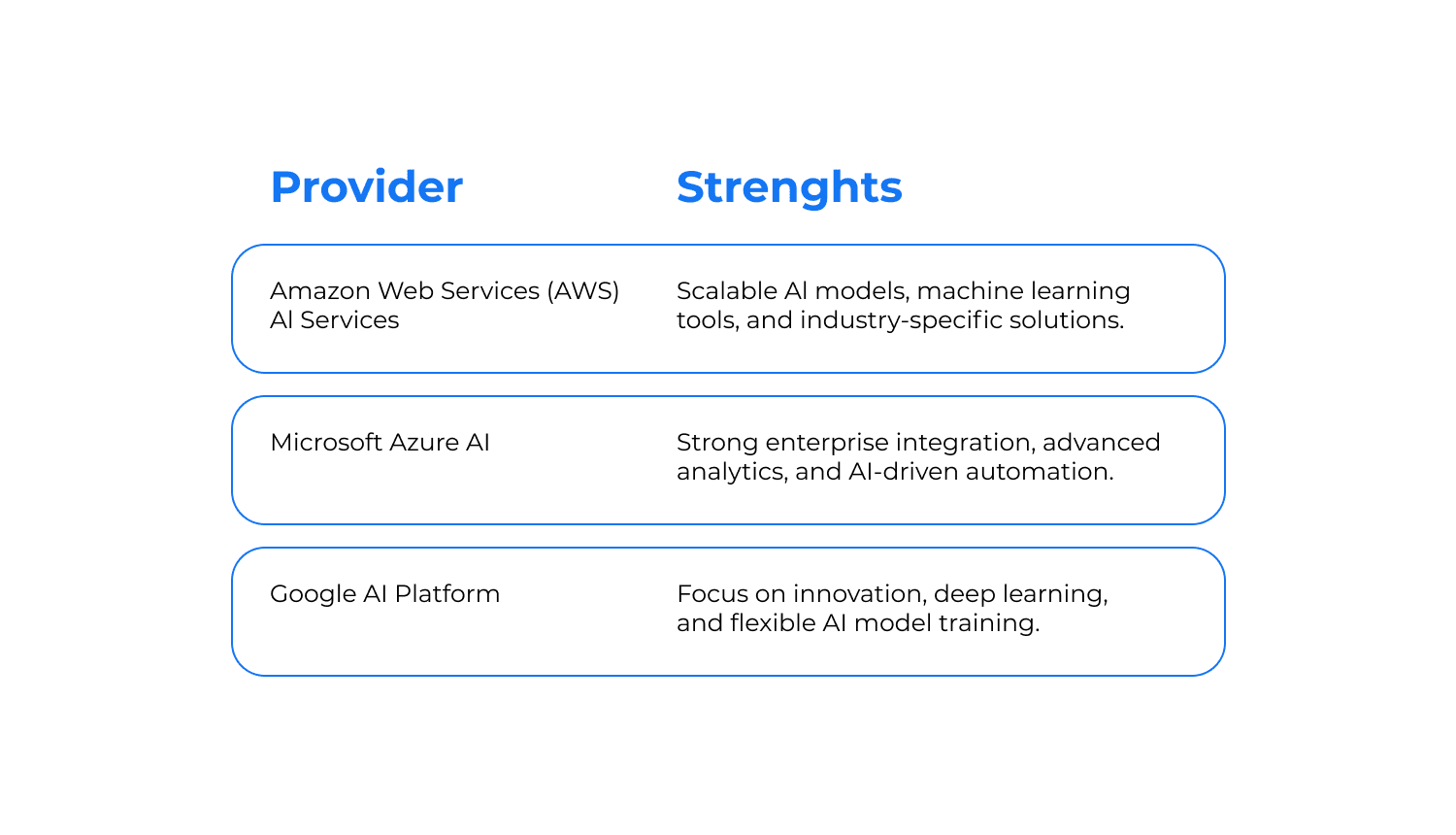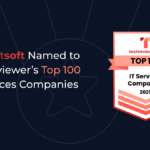Updated: February 10, 2025
Artificial intelligence is no longer just a futuristic concept – it’s transforming industries today. But for many businesses, building AI solutions from scratch is costly and complex. That’s where AI as a Service (AIaaS) comes in. AIaaS offers pre-built AI capabilities through cloud-based platforms, allowing companies to leverage artificial intelligence in business without needing deep in-house expertise.
As AI adoption accelerates, AIaaS is gaining traction as a scalable, cost-effective way for organizations to integrate artificial intelligence in business operations. This article explores the AIaaS benefits for businesses, real-world applications, key providers, and practical steps for decision-makers to implement AIaaS effectively.
What Is AI as a Service?
AIaaS refers to cloud-based AI solutions that provide machine learning, natural language processing, computer vision, and predictive analytics through APIs and pre-trained models. Businesses can leverage these tools without investing in costly infrastructure or hiring AI specialists, making AI adoption more accessible and cost-effective.
Key Features of AIaaS Platforms:
- Pre-trained Models
- APIs & SDKs
- Scalability
- Managed Services
- Customizable AI Models
- Multi-Cloud & Hybrid Deployment
- Real-Time Analytics & Insights
- Security & Compliance
- Automated Updates & Maintenance
By adopting AIaaS platforms, companies can accelerate innovation, automate workflows, enhance decision-making, and optimize operations – all while reducing infrastructure costs and technical complexities.
The Business Benefits of AIaaS
As businesses compete in an increasingly digital landscape, AI adoption is no longer a luxury – it’s a necessity. However, traditional AI implementation is often expensive, resource-intensive, and time-consuming. AI as a Service is changing the game by offering cloud-based AI solutions that eliminate many of these barriers. Here’s a closer look at why companies are embracing AIaaS and how it delivers a competitive edge:
Cost-Effective AI Implementation
Many businesses hesitate to invest in AI due to high upfront costs. AIaaS eliminates this hurdle by offering a cost-efficient model that removes the need for expensive infrastructure and specialized talent. Adopt AIaaS seamlessly and stay ahead↗
Key Cost Advantages
No Hardware Investments
Traditional AI requires powerful GPUs, high-performance servers, and extensive data storage, which can be prohibitively expensive, making it difficult for many businesses to implement AI at scale. With AIaaS, companies can access AI models and computational power through the cloud, eliminating the need for costly on-premises infrastructure.
Pay-as-You-Go Pricing
Instead of hiring full-time AI experts or building AI models from scratch, businesses can subscribe to AIaaS platforms and only pay for the specific AI services they use, optimizing costs and resources. This flexible pricing model allows organizations to scale AI usage up or down based on demand, avoiding unnecessary expenses associated with underutilized AI resources.
Reduced Maintenance Costs
AI models require constant updates, monitoring, and fine-tuning to maintain optimal performance and adapt to evolving business needs. AIaaS providers handle these technical aspects, ensuring models remain efficient, secure, and up to date without requiring internal teams to manage complex AI maintenance.

Scalability and Flexibility
One of the standout benefits of AIaaS platforms is their ability to scale AI capabilities up or down based on business needs. Whether a company needs basic AI automation or complex machine learning models, AIaaS provides the flexibility to adapt.
Key Scalability Benefits:
Easily Scale AI Resources
AIaaS allows businesses to adjust computing power, storage, and AI model complexity in real-time, ensuring they can meet changing operational demands efficiently. This scalability is particularly beneficial for companies experiencing fluctuating workloads, seasonal demand spikes, or sudden increases in data processing requirements.
Global AI Deployment
Because AIaaS operates on cloud infrastructure, businesses can deploy AI models globally, enabling seamless real-time AI applications across different regions and markets. This ensures that companies can deliver AI-driven services with minimal latency, regardless of geographical location, improving customer experiences and operational efficiency.
Adapt AI Usage to Business Growth
As companies expand, they can seamlessly integrate additional AI capabilities without overhauling their existing IT infrastructure, allowing for a smooth and cost-effective scaling process. AIaaS enables businesses to introduce new AI-driven functionalities – such as automation, predictive analytics, or enhanced customer interactions – without disrupting ongoing operations.
Faster Time-to-Market
Traditional AI development can take months – or even years – to implement, from training models to deploying them into production. AIaaS accelerates this process by providing businesses with ready-made AI solutions that can be deployed within days or weeks.
Key Speed Benefits:
Pre-Trained AI Models
AIaaS providers offer out-of-the-box AI tools for tasks like image recognition, sentiment analysis, and predictive analytics, allowing businesses to implement AI functionalities without extensive development efforts. These pre-trained models have already been optimized and tested, reducing the time required for training and fine-tuning while ensuring high accuracy and efficiency.
Seamless Integration
AIaaS solutions connect easily with existing enterprise software, such as CRMs, ERPs, and e-commerce platforms, ensuring smooth adoption without major system overhauls. This seamless integration minimizes technical barriers, allowing businesses to enhance their workflows with AI-driven automation, predictive analytics, and intelligent decision-making.
Rapid Prototyping & Testing
Businesses can experiment with AI quickly by launching pilot programs, testing different use cases, and refining AI models before committing to full-scale deployment. This iterative approach allows organizations to assess AI performance, gather user feedback, and fine-tune implementations to better align with business objectives.
Access to Cutting-Edge AI Technologies
AI is evolving rapidly, and businesses that want to stay ahead need access to the latest machine learning models, deep learning techniques, and AI innovations. AIaaS ensures companies can leverage the most advanced AI tools without needing to develop them in-house.
Key Technological Benefits:
Advanced AI Models
AIaaS providers constantly update and refine AI models, ensuring businesses always have access to the latest breakthroughs in natural language processing, computer vision, and machine learning, keeping them competitive in an evolving market. These improvements enhance the accuracy, efficiency, and adaptability of AI applications, enabling businesses to leverage cutting-edge technology without the need for in-house AI development.
AI-Driven Insights for Better Decision-Making
AIaaS enables businesses to extract actionable insights from vast amounts of data, allowing for more accurate forecasting, trend analysis, and real-time decision-making across departments such as marketing, finance, and HR.
Innovation Without R&D Costs
Instead of investing heavily in AI research and development, businesses can experiment with state-of-the-art AI tools through AIaaS platforms, eliminating the financial and operational risks associated with in-house innovation. This approach allows companies to access advanced AI capabilities without the need for dedicated AI teams, reducing the time and resources required for AI adoption.
Key AIaaS Use Cases Across Industries
AI as a Service is making significant inroads across various industries, offering scalable and cost-effective solutions. Unlock AI’s full potential↗. Here are some recent real-world applications:
Retail
Personalized Product Recommendations
Retailers are leveraging AIaaS to analyze customer behavior and preferences, delivering tailored product suggestions that enhance the shopping experience.
Automated Inventory Management
AIaaS solutions predict demand trends, enabling retailers to optimize stock levels, reduce shortages, and minimize overstock situations.

Healthcare
AI-Powered Diagnostics
Healthcare providers utilize AIaaS to interpret medical images, assisting in the early detection of diseases such as cancer, thereby improving patient outcomes.
Predictive Analytics for Patient Care
By analyzing patient data, AIaaS platforms forecast disease progression and hospital resource needs, facilitating proactive care and efficient resource allocation.
Finance
Fraud Detection and Risk Assessment
Financial institutions employ AIaaS to monitor transactions in real-time, identifying fraudulent activities and assessing risks more effectively.
AI-Driven Customer Service
AI-powered chatbots provide customers with instant support and personalized financial advice, enhancing service efficiency and client satisfaction.
Manufacturing

Predictive Maintenance
Manufacturers use AIaaS to analyze equipment data, predicting potential failures and scheduling maintenance to prevent unplanned downtime.
Quality Control through Image Recognition
AIaaS applications inspect products on assembly lines, identifying defects with greater accuracy than manual inspections.
Top AIaaS Providers to Consider
Several AIaaS providers offer robust AI services. Here are three major players:

Each provider has unique strengths, so businesses should choose based on their needs, scalability, and integration requirements.
Challenges of Adopting AIaaS
While AI as a Service presents businesses with significant advantages, decision-makers must carefully navigate potential challenges to ensure a smooth and secure AI adoption process. Understanding these hurdles – and how to overcome them – can help companies maximize AIaaS benefits for business while mitigating risks.
Data Security & Privacy
As AIaaS operates on cloud-based platforms, businesses must store and process sensitive data remotely, raising concerns about data security, privacy compliance, and unauthorized access. Industries such as healthcare, finance, and legal services handle highly regulated data, making security a top priority.
Challenge
Using third-party AIaaS platforms to process sensitive customer data increases exposure to cyber threats, data breaches, and compliance risks. Some providers store training data, raising concerns about data ownership and confidentiality. Businesses operating under strict regulations like GDPR and CCPA must navigate complex compliance requirements, facing potential legal and financial consequences if not properly managed.
Solution
To mitigate these risks, businesses should choose AIaaS providers with strong security measures, such as end-to-end encryption, multi-factor authentication, and secure API gateways. Ensuring compliance with industry regulations like HIPAA, PCI-DSS, and GDPR helps reduce legal exposure and enhances trust.
Implementing a zero-trust security framework further strengthens data protection by restricting access to authorized users. For greater control over data storage and processing, organizations can consider on-premises AIaaS solutions or hybrid AI models, minimizing reliance on third-party cloud services while maintaining AI capabilities.
Integration with Existing Systems
Businesses often operate on legacy IT systems, custom software, or industry-specific platforms that may not be immediately compatible with AIaaS solutions. Ensuring seamless integration is crucial for avoiding disruptions and maximizing AI effectiveness.
Challenge
Many traditional enterprise applications, such as legacy ERP, CRM, and supply chain systems, were not designed to support AI-driven automation. AI models often struggle to process unstructured legacy data without additional customization. For companies with complex IT infrastructures, integrating AIaaS tools into existing workflows can require significant effort and technical adjustments.
Solution
To ensure seamless integration, businesses should choose AIaaS providers with robust APIs and SDKs that facilitate compatibility with existing software. Collaborating with AI consultants or solution architects can help develop a tailored deployment plan that aligns AI capabilities with current IT environments.
Hybrid AI solutions, combining on-premises and cloud-based services, can further optimize integration. Running extensive testing before full-scale deployment helps identify and resolve potential conflicts with existing systems, ensuring smooth AI adoption.
Measuring ROI from AIaaS Investments
Many businesses struggle to quantify the return on investment of AIaaS, as AI impact is often long-term, indirect, or difficult to measure. Without clear performance indicators, decision-makers may hesitate to invest further in AI solutions.
Challenge
Unlike traditional software, AI impact is gradual and iterative, making immediate ROI measurement difficult. AI models often require ongoing optimization before delivering tangible business outcomes. Additionally, many companies lack the right KPIs to track AI effectiveness in improving efficiency, reducing costs, or driving revenue growth.
Solution
Starting with pilot projects allows businesses to test AI feasibility on a small scale before expanding. Defining clear success metrics – such as cost savings, efficiency gains, improved customer satisfaction, and revenue growth – helps measure AI’s impact. Comparing AI-generated insights with manual processes provides a benchmark for decision-making improvements. Partnering with AIaaS providers that offer built-in analytics dashboards enables real-time performance tracking, ensuring data-driven investment decisions.
While AIaaS offers significant benefits, businesses must address security, integration, and ROI measurement challenges for a successful AI implementation strategy. Leverage AIaaS for smarter decision-making↗. By choosing the right AIaaS providers, defining clear AI goals, and ensuring proper system integration, decision-makers can unlock AI’s full potential without unnecessary risks. AIaaS is not just about adopting artificial intelligence – it’s about integrating intelligent, scalable, and secure AI solutions that drive business growth.
How Decision-Makers Can Leverage AIaaS
Successfully implementing AI as a Service requires more than just selecting a provider – it demands a strategic, phased approach to ensure smooth integration and maximum business impact. Business leaders must align AI adoption with their specific goals, operational needs, and workforce readiness. By following these key steps, decision-makers can effectively leverage AIaaS for long-term success.
Step 1: Define Business Objectives
Before adopting AIaaS, companies must clearly define the business problems they aim to solve, as implementing AI without a clear purpose can lead to unnecessary costs with unclear benefits. Businesses should first identify areas where AI can enhance efficiency, reduce costs, or improve decision-making, such as automating customer service, optimizing supply chains, or detecting fraud.
It is also essential to assess whether AIaaS aligns with long-term business strategies, ensuring scalability and adaptability to future needs. To measure AI’s effectiveness, companies should establish clear KPIs, such as customer retention rates, process automation success, and revenue growth, allowing for continuous evaluation and optimization of AI solutions.
Step 2: Evaluate AIaaS Providers
Not all AIaaS platforms offer the same level of functionality, scalability, security, or cost-effectiveness, making it essential for decision-makers to carefully compare options. Businesses should assess AI capabilities by determining whether a provider offers pre-trained models, APIs, or fully customizable AI solutions. Security and compliance must also be a priority, ensuring the provider implements strong encryption, meets regulatory standards like GDPR and HIPAA, and follows robust security protocols.
Scalability is another key factor – organizations should evaluate whether the AI solution can grow with their business needs or if it is limited to specific use cases. Additionally, pricing models vary across providers, with options such as pay-as-you-go, subscription-based plans, or enterprise-level customization, requiring businesses to select the most cost-effective approach for their AI adoption.
Step 3: Run a Pilot Program
Jumping into full-scale AI adoption without testing feasibility can lead to costly inefficiencies. Running a pilot program enables businesses to test AI capabilities on a small scale, measure its effectiveness, and refine models before committing to a large-scale rollout.
A good approach is to start with a limited-use case, such as using AI chatbots to handle FAQs before expanding to more complex queries. AI performance should be continuously monitored against predefined KPIs to evaluate its impact on efficiency, cost reduction, and overall business operations.
Gathering feedback from employees and customers is also crucial, as it helps identify areas for improvement and ensures that AI solutions align with user needs and expectations.
Step 4: Train Employees & Foster AI Adoption
AI is most effective when employees understand how to use it efficiently. Businesses must invest in hands-on training to help teams familiarize themselves with AI functionalities and leverage AI-driven insights in daily operations.
Promoting AI literacy across departments ensures that adoption becomes a company-wide initiative rather than just an IT project, fostering a culture of AI readiness. Encouraging collaboration between AI models and human expertise is also vital—rather than replacing employees, AI should be positioned as a tool that enhances productivity, decision-making, and innovation, ensuring a balanced approach to automation and human-led strategy.
A Strategic Path to AI Success
AIaaS provides a powerful opportunity for businesses to accelerate AI adoption without the complexities of in-house development. However, decision-makers must take a structured approach – aligning AI with business goals, carefully selecting providers, testing AI solutions, and ensuring workforce readiness.
AI as a Service is transforming artificial intelligence in business, making AI adoption more accessible, scalable, and cost-effective. By eliminating the need for extensive in-house infrastructure and expertise, AIaaS enables companies to leverage AI-driven insights, automation, and innovation with minimal barriers. Intellectsoft provides end-to-end support, ensuring businesses can seamlessly integrate AI technologies, customize AI models, and extract meaningful insights to drive growth.
With our expertise in AI-driven custom solutions, Intellectsoft ensures that companies can leverage AIaaS with minimal risk, optimizing AI adoption while maintaining security, compliance, and operational continuity.
Subscribe to updates
Source link











